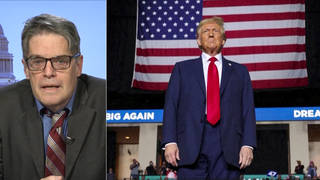HeadlinesOctober 15, 2007
Military Junta Detains Four Prominent Burmese Dissidents
The military junta in Burma has detained four prominent Burmese dissidents as part of a continued crackdown down on critics of the military regime. Htay Kywe was detained after being the target of a huge two-month manhunt. He has been one of Burma’s leading pro-democracy activists since he helped lead the student uprising in 1988. He has already spent 15 of the past 20 years in jail. Just prior to his arrest Kywe told the BBC that the military regime is attempting to destroy the entire opposition movement in Burma. U.N. envoy Ibrahim Gambari described the recent arrests as extremely disturbing.
Chinese Oil Company CNOOC, Chevron, Total Refuse to Pull Out of Burma
Meanwhile, the Chinese state-run oil company CNOOC has announced it won’t pull out of Burma. The company claims it is making people’s lives better by developing resources in the country. The California-based oil company Chevron and the French oil company Total have also vowed to stay in Burma.
Tensions Escalate Between Turkey and U.S. over Genocide Vote
Tension continues to escalate between the United States and Turkey following a House committee vote calling the 1915 massacre of Armenians by Ottoman Turks genocide. The commander of Turkey’s armed forces warned that U.S.-Turkish military relations will be irreparably damaged if the full U.S. House of Representatives approves the resolution. Turkey has been one of the closest U.S. allies in the region. Seventy percent of U.S. air cargo headed for Iraq goes through Turkey. The White House has opposed the genocide resolution and has dispatched a diplomatic team to Turkey to deal with the crisis.
Undersecretary of Defense Eric Edelman: “We had a good and constructive discussion in which our colleagues expressed the disappointment and the hurt of both the government of Turkey and the Turkish public.”
Turkish Troops Shell Northern Iraq
Meanwhile, Turkey has amassed 60,000 troops along the country’s border with Iraq, and Turkish forces have begun shelling Kurdish regions across the border. Turkey’s parliament is expected soon to approve a government request to authorize a ground invasion of northern Iraq in order to attack Kurdish rebel bases. On Saturday, a Kurdish rebel commander predicted Turkey would face a long and bloody conflict if it launched a large-scale offensive.
Washington Post Journalist Killed in Baghdad
In Iraq, a Washington Post correspondent was shot dead in Baghdad on Sunday. The 32-year-old Salih Saif Aldin had worked for the paper since 2004. Iraqi police officers said they believe Saif Aldin was killed by members of the Sunni tribal organization the Awakening Council, which is aligned with the U.S. military. Iraqi government officials have accused the Sunni group of abusing its partnership with the Americans by killing and kidnapping residents. Aldin, who was born in the Iraqi town of Tikrit, is the first Washington Post reporter to be killed during the war. According to the Committee to Protect Journalists, at least 118 journalists have been killed in Iraq while on duty.
Former U.S. General: War in Iraq is “Nightmare with No End in Sight”
The former U.S. military commander in Iraq, retired Lieutenant General Ricardo Sanchez, has described the war as a “nightmare with no end in sight.” He blamed the Bush administration for developing a “catastrophically flawed, unrealistically optimistic war plan.”
Lt. Gen. Ricardo Sanchez: “Who will demand accountability for the failure of our national political leadership involved in the management of this war? They have unquestionably been derelict in the performance of their duty. … In my profession, these types of leaders would immediately be relieved or court-martialed. … The best we can do with this flawed approach is stave off defeat.”
Sanchez was the chief of U.S. forces in 2003 and 2004 during the time of the torture scandal at Abu Ghraib.
Namibia Deports Two Americans for Recruiting Guards to Work in Iraq
The African country of Namibia has ordered two Americans deported after they tried to recruit Namibians to work for a private security company in Iraq and Afghanistan. The Americans worked for the Nevada-based company Special Operations Consulting-Security Management Group. Local newspapers reported the company was trying to recruit at least 3,000 Namibians to work in Iraq and Afghanistan for a promised salary of $1,000 a month.
Blackwater Founder Dismisses Lawsuit as “Politically Motivated”
The founder of Blackwater USA, Erik Prince, has dismissed a new lawsuit against his company as politically motivated. Last week, the Center for Constitutional Rights filed a suit in U.S. courts on behalf of a wounded survivor and relatives of three Iraqis killed last month by Blackwater forces in Baghdad. The lawsuit charged that Blackwater violated U.S. law by committing extrajudicial killings and war crimes. Prince was questioned about the lawsuit on CNN.
Erik Prince: “First, on the lawsuit, the lawyers, the trial lawyers that filed this lawsuit, are the same guys that defended the World Trade Center bombings in 1993, the blind sheikh, and have defended a bunch of killers of FBI agents and other cops. So this is very much a politically motivated lawsuit for media attention.”
U.S. Officials Concerned Private Contractors Are Unlawful Combatants
Meanwhile, the Los Angeles Times reports some Bush administration officials are now concerned that private contractors could be considered unlawful combatants under international agreements. Naval War College Professor Michael Schmitt said, “It is a war crime to kill civilians unlawfully in an armed conflict.”
Al Gore: Global Warming Is “Planetary Emergency”
Nobel Peace Prize winner Al Gore has said he plans to use the honor and recognition of the award as a way to speed up the change in awareness about global warming.
Al Gore: “It truly is a planetary emergency, and we have to respond quickly. There’s an old African proverb that says if you want to go quickly, go alone; if you want to go far, go together. We have to go far, quickly, and that means we have to quickly find a way to change the world’s consciousness about exactly what we’re facing and why we have to work to solve it.”
U.N. Secretary-General Ban Ki-moon praised Gore and the U.N. Intergovernmental Panel on Climate Change for winning this year’s Nobel Peace Prize.
Secretary-General Ban Ki-moon: “This is clearly a recognition of international community, in general, and by Nobel Committee, in particular, the urgency and significance of this global warming phenomenon of the international community. This says there is an unprecedented momentum in the world to take necessary action.”
Report: Bush Administration Sought Phone Records Before 9/11
The former chief executive at Qwest Communications says his company lost hundreds of millions of dollars in government contracts after it refused to participate in a secret National Security Agency spy program that the company thought was illegal. Former chief executive Joseph Nacchio said the NSA approached Qwest about participating in the surveillance program six months before the Sept. 11 attacks. In July, Nacchio was sentenced to six years in prison for insider trading, but he is currently free on appeal. Court documents released last week show a federal judge rejected multiple requests from Nacchio to introduce information about the government’s controversial phone-tapping program as part of his defense against insider-trading charges.
Vermont Law Firm Says Federal Gov’t Has Tapped Its Phones
Meanwhile, the Vermont law firm of Gensburg Atwell & Broderick has warned its clients that it believes the federal government has tapped its phones and hacked into its computer system. The Burlington Free Press reports a Verizon technician recently found the law firm’s phone lines were crossed. A forensic examination of one of the firm’s computers found an application that disabled all security software and would have given someone access to all information on the computer. The firm represents a client in Afghanistan as well as one of the prisoners held at Guantánamo.
U.N. Expert to Urge U.N. to Withdraw from Middle East Quartet
A top United Nations expert says he will urge the U.N. to withdraw from the Middle East Quartet unless the group of international mediators addresses Palestinian human rights. John Dugard told the BBC the U.S., EU, U.N. and Russia were failing to protect the Palestinians. He accused Israel of setting up checkpoints throughout the West Bank in an attempt to make the life of Palestinians as miserable as possible.
Justice Department Official: “Minorities Don’t Become Elderly”
The chief of the Voting Rights section of the Civil Rights Division at the Justice Department has admitted that elderly voters might be disenfranchised by new restrictive voter ID laws. John Tanner made the comment earlier this month at the National Latino Congreso. Tanner went on to say white elderly voters would be harmed most by the voter ID laws because most minorities die before becoming elderly.
John Tanner: “Of course, that also ties into the racial aspect, because our society is such that minorities don’t become elderly — the way white people do. They die first, through inequities in healthcare. There are a variety of inequities in this country. And so, anything that disproportionately impacts the elderly has the opposite impact on minorities. Just, the math is such as that.”
His comments were recorded by the Brad Blog.
Smith College Psychology Dept. Condemns APA Interrogations Policy
The Psychology Department at Smith College in Massachusetts has passed a resolution urging the American Psychological Association to ban its members from designing or taking part in interrogations at Guantánamo or CIA black sites. The psychology departments at two Quaker colleges — Earlham College in Indiana and Guilford College in North Carolina — have passed similar resolutions.
Thousands Protest in Belarus
In Belarus, thousands of demonstrators took to the streets on Sunday in a rare protest against the authoritarian regime of President Alexander Lukashenko. Protesters decried Lukashenko as the last dictator in Europe. Police reportedly detained 500 opposition activists.
Iraq War Veteran Returns War Medals to Protest War
An Iraq War veteran has returned all of his war medals to protest what he describes as the illegal invasion and occupation of Iraq. Specialist Mike Sanger returned the medals on Friday to the office of Democratic Congressman Dennis Moore of Kansas. Sanger said he chose to target Moore’s office because the Democrat has supported the continued funding of the war. Since returning from Iraq, Sanger has become a vocal war critic and now serves as president of Iraq Veterans Against the War in Kansas City. During the war, Sanger received the National Defense Medal, the War on Terror Medal and a combat medal.
Native American Activist, Vernon Bellecourt, 75, Dies
And the Native American activist Vernon Bellecourt has died at the age of 75. He was a leader of the American Indian Movement and longtime supporter of political prisoner Leonard Peltier. In recent years he served as president of the National Coalition on Racism in Sports and Media. The group fought against sports teams having Native Indian names or mascots. Bellecourt had recently returned from a meeting in Venezuela to discuss President Hugo Chávez’s program for providing heating assistance to Native American tribes.
Most popular
- 1
- 2
- 3
- 4
Non-commercial news needs your support
Please do your part today.











Media Options